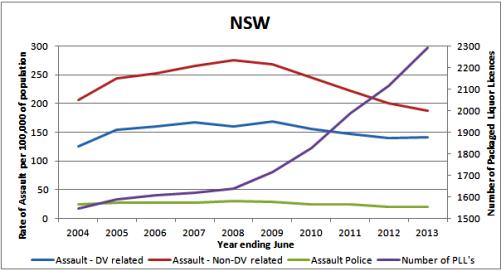By James Atkinson
There is no evidence whatsoever that an increase in retail liquor outlets will result in an increase in alcohol-related violence in the Australian community, the Australian Liquor Stores Association (ALSA) has reaffirmed.
The Harper Competition Policy Review Draft Report this week recommended that retail liquor licensing should be prioritised as part of a proposed review of regulatory restrictions.
The recommendation prompted a familiar refrain from the anti-alcohol lobby; that more retail alcohol outlets, as a result of deregulation, could lead to more alcohol-fuelled violence.
Responding to the claim, ALSA today said the facts demonstrate quite the reverse.
“NSW is fortunate to have excellent and robust data available from the NSW Bureau of Crime Statistics and Research which demonstrate that an increase in off-licences has no correlation with alcohol-related violence,” the Association said.
“The number of packaged (off-licence) liquor licences in NSW has increased by 38 per cent over the past five years, while at the same time alcohol-related violence has declined and the rates of domestic violence and assaults against Police have remained stable.”
NSW increase in packaged liquor outlets (2004 – 2013) vs rate of alcohol related assault per 100,000 population as per Bureau of Crime Statistics and Research (BOCSAR) data
The Association added that ABS data from April this year demonstrated that “Australians are drinking less pure alcohol overall than any time in the previous 15 years”.
“Numerous Government surveys including the Australian Bureau of Statistics, AIHW National Drug Strategy Household Surveys, The Australian Secondary Schools Alcohol and Drugs Survey all demonstrate that overall consumption and per capita consumption is falling, levels of risky drinking have stabilised or are falling while at the same time rates of abstinence – particularly among people below the legal drinking age and pregnant women – are increasing.”
“The majority of Australian adults (82.4 per cent of Australians aged over 18 years ) consume alcohol responsibly and it is important to distinguish between the moderate consumption of alcohol, which is a normal enjoyable aspect of life for the vast majority of adults, with the misuse of alcohol by a small minority,” ALSA said.
“The proportion of people abstaining rose from 17 per cent in 2007 to 19 per cent in 2010 (a statistically significant difference) and the largest increase in abstainers was seen among those aged 12–17.”
The Association said the data provides “clear evidence that alcohol-related harms in the community have declined during a period when consumers have benefited from increased availability, lower real costs, and increased competition through exposure to alcohol marketing”.
“Common-sense says it is now appropriate to review alcohol regulation through both an economic and healthy community social well-being lifestyle lens rather than purely a public health lobbyist perspective,” it said.
“ALSA is hopeful that the Harper Competition Policy Review Draft Report released this week will help identify ways to build the economy and promote investment, growth, job creation and benefits to retailers and consumers,” CEO Terry Mott said.

